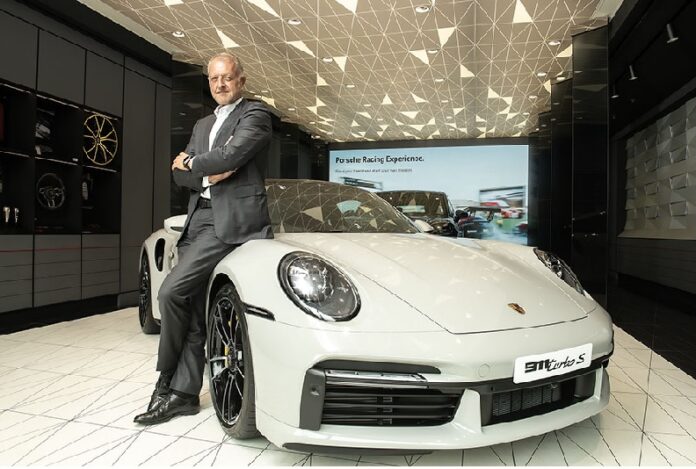When it comes to content development, three key aspects stand out: “perplexity,” “burstiness,” and “predictability.” Perplexity serves as a gauge for measuring the text’s complexity. Burstiness, on the other hand, takes the pulse of sentence variants. Finally, predictability assesses the likelihood of correctly guessing the following sentence. Human writing has a unique tendency toward more burstiness, combining big and elaborate words with short ones. AI-generated sentences, on the other hand, tend to be uniform. As a result, as we approach the challenge of creating the subsequent material, we want to infuse a good dosage of ambiguity and burstiness while limiting predictability. The canvas is only the English language. Let us now alter the following text:
“Surging Ahead: Porsche’s Detlev von Platen Observes Faster Expansion of the Indian Luxury Auto Market”
In the year 2022, Porsche India delivered an astounding total of 779 automobiles within the country’s borders. With an estimated client base of 4,000 in India, the famed German manufacturer of premium sports cars has already sold 350 vehicles this year.
The manufacturer has decided to forego domestic production ambitions, with prices ranging from Rs 88 lakh to Rs 4.26 crore. Instead, it plans to expand its presence by opening 10 showrooms across the country by the end of the year. These observations come from Detlev von Platen, an esteemed member of the executive board in charge of sales and marketing.
While Europe remains Porsche’s largest market, followed by the United States and China, von Platen highlights India as an increasingly important component in this grand symphony.
During a recent trip to India, von Platen spoke with Forbes India, sharing insights about the company’s current offers, electric possibilities, and his perception of the Indian market. The following are edited excerpts from this lively discussion:
Q. Growth is dramatically reshaping the parameters of India’s premium auto industry. How does Porsche view this emerging tendency, and what elements play a role in your analysis?
This shift is orchestrated by a sophisticated combination of elements, the most important of which is India’s standing as one of the world’s fastest-expanding economies. The country has a growing population, which plays an important role in this story. Furthermore, the advent of a growing affluent strata has fueled this evolution. A palpable affection for luxury marques is also gaining steam, leading me to believe that the Indian premium and luxury automobile market is primed to outperform the world automotive stage. Porsche India, as a company, focuses its efforts on creating personalized services, creating an atmosphere of exclusivity. This devotion, I believe, underpins the company’s growth trajectory.
Q. How does Porsche balance its broad global brand character with the task of catering to the diverse tastes of India’s discriminating consumer base?
Our attempts include a customised initiative known as the Exclusive Manufaktur program, which allows customers to personalize and tailor their automobiles to their own desires. Collaborative synergy is also promoted with our Indian cohort, with the goal of achieving homologation for a greater range of models, attuning them to the government’s prerequisites and criteria. It is worth noting, however, that any intentions for domestic manufacture are currently on hold.
Q. How does Porsche map its route in the field of sustainable transportation in India? Do objectives include the incorporation of environmentally friendly technologies or initiatives?
The Porsche Taycan, our first battery-electric product, commanded a remarkable 10% share of sales in the Indian market last year. The all-electric Macan will make its debut in 2024, with India being a prominent destination for this reveal. In addition, plans are in the works to deliver all-electric iterations of the 718 series in the mid-decade period, followed by a similar makeover of the Cayenne series.
A new all-electric performance-focused SUV is set to grace the market in an effort to widen our product line, forging a niche above the Cayenne sector. The plan also includes the establishment of Porsche Destination Chargers all around the world, including India. Concurrently, Porsche Centers are hard at work on charging strategies. This collaborative project creates a global charging network, providing owners of fully electric Porsche vehicles and plug-in hybrids with seamless charging options at various locations, including accommodations, restaurants, golf courses, and marinas.
Q. What vistas stand out as noteworthy prospects for Porsche as it navigates the realm of the Indian luxury auto business, and what obstacles demand attention on this journey?
Our perspective is centered on seizing opportunities rather than focusing on problems. The expanding middle and upper-middle classes in India stand out as a tangible option for luxury cars to pursue. Aligned with the global and Indian focus on sustainability and carbon footprint reduction, the acceptance of electric mobility resonates beautifully with Porsche’s ethos. The potential for our electric cars grows dramatically as the underlying infrastructure improves. With India as a critical market, our focus is steadfast, motivated by a strong desire to gain insights and enhance our grasp of this volatile terrain.


